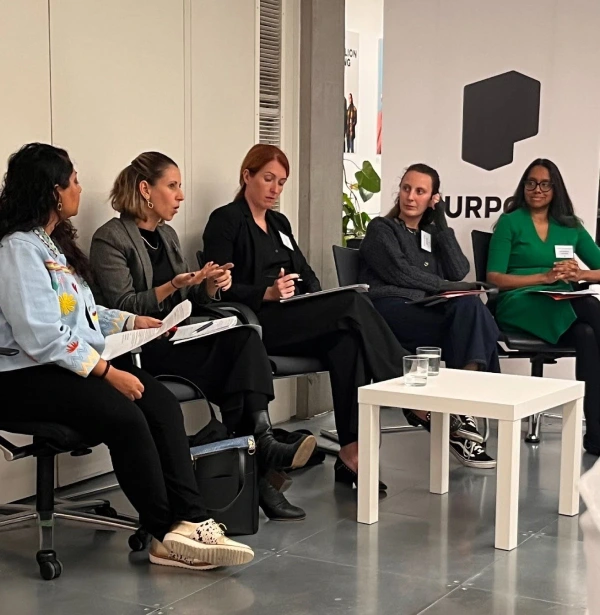Shaping Tomorrow’s Justice: Women’s Equal Participation in Law
Advocating women's leadership in justice systems
Sofia Mutinelli

This October, the GQUAL Campaign and Purpose convened a timely and thought-provoking discussion about women’s leadership and equal participation in law. The event brought together leaders from across sectors – including campaigners, civil society, gender experts, lawyers, academics, and policymakers – to discuss a pressing issue: the underrepresentation of women in the law & justice sector.

The Ripple Effect of Women in Law
Despite progress in gender equality and an increase in women excelling in law education in recent years, underrepresentation persists. Achieving gender equality in the legal sector is fundamental to creating fair and effective justice systems that truly serve everyone. Why? Women in law often create a positive ripple effect far beyond the legal profession, creating economic opportunities, advancing social justice, and setting precedents that shape our daily lives.
The panel discussion – facilitated by Sabrina Mahtani, Zambian-British lawyer and founder of Women Beyond Walls – explored the barriers that women face at different stages in their legal careers, as well as successful strategies for driving change. Sabrina was joined by experts Judge Ita Farrelly, District Tribunal Judge and Europe Regional Director at the International Association of Women Judges; Maria Noel Leoni, Director of the GQUAL Campaign; Natalie Samarasinghe, Co-founder of the #1for8billion Campaign; and Emma Snell, Legal Policy manager at JUSTICE.
Drawing on their extensive experience, they explored women’s participation across the legal spectrum – from judicial appointments, to law firms, academic positions, and roles in international justice. The conversation highlighted that women face similar barriers at the local, national, and international level, and emphasized four key insights:
Women in Leadership Bring Credibility to Institutions
True representation goes beyond reaching 50% parity – it’s about bringing diverse perspectives to decision-making processes. As Emma Snell noted, “The law and justice sector must reflect the society it serves. Women bring much-needed lived experience to the table, across a range of legal contexts. We know that the more intersectional representation there is on panels, the more comprehensive the justice outcomes”. This diversity isn’t just about fairness—it’s also about effectiveness and trust. In an era of declining institutional trust, women in leadership positions bring fresh perspectives and transformative ways of working that strengthen the credibility and legitimacy of our legal and governance systems.
Progress is Fragile
Despite encouraging advancements, progress in this space remains fragile. Panelists noted that nothing prevents the next election or nomination from sliding backwards, especially as we are witnessing a backlash to women’s rights globally.
Holding institutions accountable for obstacles that prevent women from advancing in the legal field is key, from improving opaque selection processes and ensuring gender parity as a criteria for appointments in international positions, to supporting women in balancing their career with their personal life. There’s a growing call for conversations around bereavement, flexible working, menopause, care policies, neurodiversity, and even self-defense in the legal profession.
Data is A Girl’s Best Friend
Collecting and presenting clear statistics serves as a powerful advocacy tool and accountability mechanism. Maria Noel Leoni of the GQUAL Campaign shared a key message from one of the Campaign’s supporter “Data is a girl’s best friend”, adding that “In all seriousness – people find it difficult to argue when they are faced with the numbers“. She presented eye-opening statistics that demand action:
- Women occupy only 17% of positions in main international and regional tribunals.
- Only 4 out of 15 judges on the International Court of Justice are women.
The GQUAL Campaign also highlighted a stark example: despite the UK’s status as the country with the most judges appointed to the European Court of Human Rights, all eight judges selected to date have been men – they have never appointed a woman. This glaring gender imbalance highlights much-needed change in the nomination processes for international decision making bodies.
We’re Yet to Break the Highest Glass Ceiling
The absence of a female UN Secretary-General underscores persistent gender disparities in global leadership. Natalie Samarasinghe of the #1for8billion Campaign emphasized that appointing a woman to this role could “fundamentally reshape priorities, policies, processes, and representation across the entire UN system.” The appointment of a female SG would also serve as a powerful catalyst for norm change for women in leadership. By setting a new standard at the highest level of global governance, it could accelerate the acceptance and expectation of women’s leadership across international organizations, national governments, and local institutions, creating a ripple effect of gender equality in decision-making roles worldwide.
The Path Forward
There is still work to do to accelerate progress, manage backlash, and drive awareness that intersectional leadership and gender equality are essential ingredients for effective and legitimate legal institutions.
When we posed the question – “what could people in this room do?” The answers were clear:
- Advocate for women’s participation in law across the spectrum, recognizing that 50% representation is the bare minimum.
- We need to put pressure on States to nominate and appoint women in leadership roles in international legal bodies taking gender parity into account.
- Continue holding conversation and building partnerships to support gender equality in law, and be ready to find allies in unexpected places. Panelists shared that they unlocked surprising champions for the cause when tailoring arguments to different contexts and audiences.
- Be proactive about inspiring change, from calling for transparency and gender parity in recruitment processes, to the creation of more inclusive career paths and working environments.
Achieving women’s equal participation in law and international governance is about creating more just, effective, and trusted systems for everyone. As Sabrina Mahtani put it, “This isn’t just about changing the face of law, it’s about shaping justice and setting precedents for generations to come”.